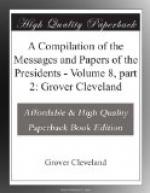I can scarcely deem it otherwise than superfluous to observe that the assembly will be in its nature diplomatic and not legislative; that nothing can be transacted there obligatory upon any one of the States to be represented at the meeting, unless with the express concurrence of its own representatives, nor even then, but subject to the ratification of its constitutional authority at home. The faith of the United States to foreign powers can not otherwise be pledged. I shall, indeed, in the first instance, consider the assembly as merely consultative; and although the plenipotentiaries of the United States will be empowered to receive and refer to the consideration of their Government any proposition from the other parties to the meeting, they will be authorized to conclude nothing unless subject to the definitive sanction of this Government in all its constitutional forms. It has therefore seemed to me unnecessary to insist that every object to be discussed at the meeting should be specified with the precision of a judicial sentence or enumerated with the exactness of a mathematical demonstration. The purpose of the meeting itself is to deliberate upon the great and common interests of several new and neighbouring nations. If the measure is new and without precedent, so is the situation of the parties to it. That the purposes of the meeting are somewhat indefinite, far from being an objection to it is among the cogent reasons for its adoption. It is not the establishment of principles of intercourse with one, but with seven or eight nations at once. That before they have had the means of exchanging ideas and communicating with one another in common upon these topics they should have definitively settled and arranged them in concert is to require that the effect should precede the cause; it is to exact as a preliminary to the meeting that for the accomplishment of which the meeting itself is designed.
Among the inquiries which were thought entitled to consideration before the determination was taken to accept the invitation was that whether the measure might not have a tendency to change the policy, hitherto invariably pursued by the United States, of avoiding all entangling alliances and all unnecessary foreign connections.
Mindful of the advice given by the father of our country in his Farewell Address, that the great rule of conduct for us in regard to foreign nations is, in extending our commercial relations, to have with them as little political connection as possible, and faithfully adhering to the spirit of that admonition, I can not overlook the reflection that the counsel of Washington in that instance, like all the counsels of wisdom, was founded upon the circumstances in which our country and the world around us were situated at the time when it was given; that the reasons assigned by him for his advice were that Europe had a set of primary interests which to us had none or a very remote relation; that




